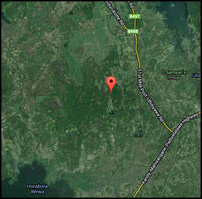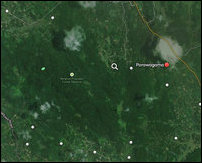Know the Etymology: 333
Place Name of the Day: Saturday, 15 March 2014
Poruwa-danda, Gal-poru-yaya
போருவத3ண்ட3, க3ல்போருயாய
Pōruvadaṇḍa, GalpōruyāyaPoaruwa+da'nda
Gal+poaru+yaaya
The forest to cut trees
The expanse of rocky raised ground
| Poaruwa 1 |
To be cut or axed, felled as of trees (Sinhala, place names); Porawa, Poroa-ketiya: Hatchet, axe (Sinhala); Poroa-kaaraya: Feller of wood, one who supplied firewood to king's kitchen in Kandyan times; Poruwa-maaraa: A tree, probably cut commonly for timber or firewood, also called Gona, Wal-mediriya, Diospyros insignis (Sinhala, The National Red List, 2012, p 253); A small tree, also called Gal-karanda, Canthium didymium (Sinhala, Clough); Poruwa-malla: A tree, also called Gona, Wal-mediriya, Diospyros insignis (Sinhala, Clough); Porowa-kæændattaa: Crowned hornbill, Anthracocerus coronatus, the bird known for pecking at trees (Sinhala); Poazh: to split, saw, to be cleft, cleave-open (Tamil, DED 4599); to cleave, split, divide into parts (Kannada, DED 4599); to cut a tree by sawing (Tamil, Pathittuppaththu, 60: 5); Pu'lakka: To be split (Malayalam, DED 4560); Po'li: To break a stick or tree (Kodagu, DED 4560); ZH/ 'L > R change
|
| Poaruwa 2 |
Dias, a place where the bride and bridegroom stand during part of the marriage ceremony, board (Sinhala); Po'rai, Po'r'rai: Mountain, hill, small hill, elevated place (Tamil, DED 4567); Po'r'ra: A slight elevation in rice grounds (Malayalam, DED 4567); Por: Slope of a hill (Konda, DED 4484); Poar: reaped paddy sheaves of hay stacked as a mound (Tamil); Poruppu: Hill (Tamil); Pu'r'ru: Anthill (Tamil); Boare: Hill, hillock (Kannada, DED 4595); Top of a hill (Tulu, DED 4595);
|
| Poaruwa 3 |
A levelling implement used in agriculture, kind or roller made of wood and used for levelling or smoothing the rice fields after ploughing (Sinhala); Parampu: Roller for smoothing land newly ploughed (Tamil, DED 3949); From the root Para: To spread, be diffused, be flattened, be broad as a plane surface (Tamil, DED 3949); Paravu: To spread, to lay open to view (Tamil, DED 3949). Also see columns on Poara-theevu and Ere-poruwa for the other meanings for the term in the context of place names.
|
| Da'nda |
Forest (Sinhala, in place names); Related to Da'nduwaawa: Forest; as in Ath-Da'nduwaawa: Young forest with small trees of the size of a human hand (Sinhala, Madduma Bandara 2009); Da'ndaka: Name of a forest in the Deccan (Sanskrit, CDIAL 6129); From Da'nda/ Tha'ndu: Stalk or stem of a tree (Sanskrit/ Tamil, CDIAL 6128, DED 3056, CDIAL notes non-Indo-Aryan origins); Ta'ndaka: Tree trunk (Sanskrit, etymology traced to Dravidian and Munda, CDIAL 5527); Da'nda: Stem of a tree (Sinhala); Dandu: Wood, timber (Sinhala). See column on Dandu Hæ'la
|
| Yaaya |
Open champaign country (Sinhala, Clough); Expanse of open country (Sinhala); Tract of (usually cultivated) paddy land or a tract of forest (Sinhala, Madduma Bandara 2009); Aay: Expanse (Eezham Tamil place names); Aayatana: Place, sphere (Pali, CDIAL 1285); Aayaama: Extension, length (Sanskrit, CDIAL 1289); Length (Pali, Prakrit, CDIAL 1289); Aayvu: Width, breadth (Tamil, DED 366); Aayak-kaddu: the entire extent of land irrigated by a tank, measurement of land determining the boundaries of a village (Tamil, DED 366); Aaya: Measure, extent (Kannada, DED 366); Measure, proportion (Tulu, DED 366); Aayatte: Boundary, limit (Telugu, DED 366); Addition or omission of Y in front of A is a feature noticed in old Tamil; Thaaya: Expanding, extended, expanse of (Tamil, Changkam usage); Paay: (verb) To spread, extend; (noun) spreading, extension (Tamil, DED 4088). See column on Moo'laay.
|
| Gal |
(plural), Gala (singular): Stone, rock, rocky hill in place names (Sinhala); Kal: Stone, boulder, rock, hill, mountain (Tamil, DED 1298, Changkam usages)
|
The component Poaruwa in the context of the place name Poaruwa-da'nda seems to mean the act of cutting trees.
The component in this context is related to the Sinhala word Porawa, meaning an axe and the word form Poroa, meaning the act of cutting trees, as in the phrases Poroa-kaaraya (wood-cutter), Poroa-ketiya (axe) and Porowa-kæændatta (the bird hornbill that pecks on wood).
In such a meaning, the component Poaru seems to be a cognate of the Tamil/ Dravidian verb Poazh meaning to split, saw, cleave, divide into parts or cut a tree by sawing (DED 4599). ZH/ 'L > R change. See box.
Poazh in Changkam Tamil meaning the act of cutting or felling a tree by sawing:“Aram poazhkallaa maram padu theengkani” (Pathittuppaththu 60: 5)
“அரம் போழ்கல்லா மரம் படு தீங்கனி” (பதிற்றுப்பத்து 60: 5)
The sweet fruits coming from trees that cannot be felled by saws (meaning the trees were so huge)
* * * The word Poaruwa in Sinhala has two other common meanings. It means a dias or platform where a bride and bridegroom stand during a marriage ceremony. It also means a levelling implement in agriculture, which is in the form of a wooden roller used in levelling a ploughed field.

The location of Gal-poaru-yaaya showing the expanse of a raised ground with rock outcrops. The raised expanse of rocks, lying between two reservoirs and paddy fields, is 100-160 meters above Mean Sea Level. [Image courtesy: Google Earth]
In meaning a raised surface, Poaruwa corresponds to Tamil/ Dravidian Po'rai used in Changkam literature to mean an elevated place, Poar meaning a heap and Po'r'ra in Malayalam, meaning a slight elevation in the ground (DED 4567).
The geography of the place Gal-poaru-yaaya, confirms the phrase Gal-poaru meaning a raised ground of rock crust or outcrops. In this context, the usage of the Sinhala term Poaru tallies very much with the usage of the term Po'rai found in Changkam Tamil literature.
Poaruwa meaning a levelling implement in Sinhala seems to be related to another root, Para/ Paravu in Tamil/ Dravidian, meaning to spread, flatten, level, make anything a plane etc. (DED 3849). The word Parampu in Tamil means exactly the same as Poaruwa in Sinhala in referring to the agricultural levelling implement.
Po'rai meaning a small or shallow hill or hillock in Changkam literature:“Ku'rum po'rai ayala nedunthaa'l veangkai” (Natti'nai 157: 8)
“குறும் பொறை அயல நெடுந்தாள் வேங்கை” (நற்றிணை 157: 8)
The tall-stemmed Veangkai tree on the side of the short hillock
* * * Yaaya, meaning an expanse in Sinhala, corresponds to the component Aay found in Eezham Tamil place names, meaning the same. The etymology could be traced to Aayvu in Tamil/ Dravidian, meaning width or breadth and related words in other Dravidian languages such as Aaya in Kannada meaning extent (DED 366).
The addition or omission of Y before an A, is a feature noticed in Dravidian languages. Example: Aa'ru – Yaa'ru; Aadu – Yaadu; Aanai – Yaanai etc.
The other related words are the verb Thaaya in old Tamil meaning expanding, extending, expanse of etc., and the word Paay in Tamil/ Dravidian meaning spreading or extension (DED 4088)
In the context of Sinhala place names Da'nda means a forest. The usage comes from Da'nda/ Da'ndu meaning the stalk or stem of trees. The words are found in both Dravidian and Indo-Aryan (DED 3056, CDIAL 6128). CDIAL traces the etymology to Dravidian and Munda.
See earlier columns on
Dandu Hæ'la,
Moo'laay,
Kalmunai and
Paragala for further etymological discussions on Yaaya, Danda and Gal
* * * Poruwa-danda (Poaruwa-da'nda) is a place in Ingiriya division of Kalutara district. Presently it is a village left with little forest. But its location adjacent to today's Ingiriya Reserved Forest suggests that the place was once part of a large forest and this part was probably allowed for felling trees.
Gal-poru-yaya (Gal-poaru-yaaya) is in Mahiyangana division of Badulla district. The place is an expanse of scrub jungle on a slightly elevated terrain that is full of rock outcrops or rock crust. The elevation of the terrain is between 100 and 160 meters above mean sea level.
* * * Some related place names:Porawa, Poaru as cutting trees:
The location of Porawa-gama adjacent to a forest [image courtesy: Google Earth]
The village engaged in cutting trees; or the village of tree-fellers; Niyagama division, Galle district. There is a forest called Beraliya forest reserve, adjacent to this village
Poru-pitiya: Poaru-pitiya: The high ground plain to cut trees; Kotapola division, Matara district. The place is a forest area, with a dense forest nearby.
Poaru meaning a raised ground:Gal-poru-golla: Gal-poaru-golla: The grove of the rocky raised ground; Naula division, Matale district
First published: Saturday, 15 March 2014, 20:26
Previous columns:








